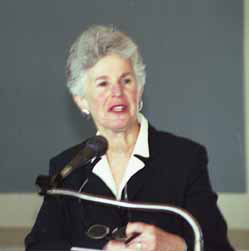Professional Development School Partnership Holds Conference at TC
"We envision this conference as a working conference. We hope you will offer your ideas." So said Michele Genor, Assistant Professor of Education in the Department of Curriculum and Teaching and the interim director of the Professional Development School (PDS) program at Teachers College, in welcoming those in attendance at the May 30th PDS Conference and 4th Annual Sharing Fair.
Published Monday, Feb. 3, 2003
